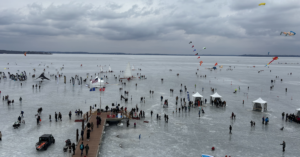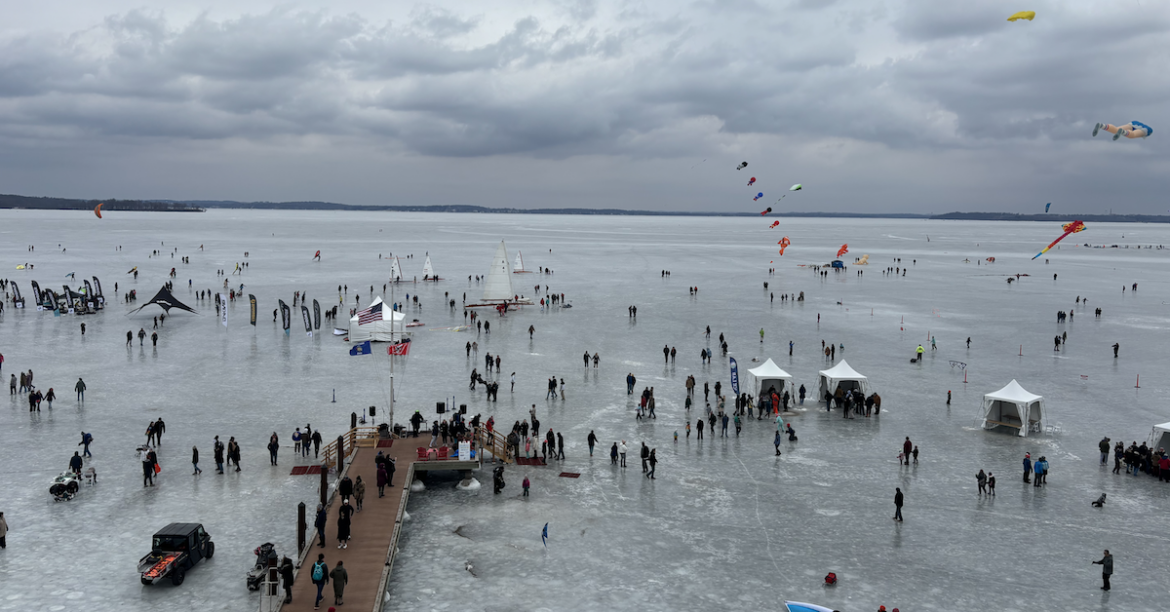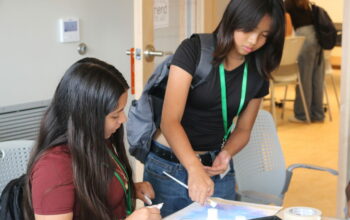As colorful dragon and jellyfish kites dotted the gray Madison sky, hundreds of people bundled up and braved the windy weather for free hot chocolate and winter activities on Lake Mendota at the 13th annual Frozen Assets Festival.
On Feb. 8, the usually barren frozen lake provided the perfect environment for bustling activities in every direction, including ice sailing, snowkiting, hockey, snowshoeing, scientific demonstrations and a 5K run, walk and skate. While electronic music boomed, runners sipped complimentary post-race beers and families enjoyed the lake as if it was a nice summer day, rather than a dreary 30-degree Saturday.
The Frozen Assets Festival, created and run by the Clean Lakes Alliance and hosted by the Edgewater Hotel, is an annual event on Lake Mendota showcasing the importance and value of the local lakes. The aim of the festival is to connect people with the local lakes, emphasizing the importance of the freshwater ecosystems for the community and the environment and why it is necessary to protect them.
“The Frozen Assets Festival is a wonderful opportunity for the community to come together and celebrate the beauty of our lakes during the winter months,” said James Tye, executive director of the Clean Lakes Alliance.
The Clean Lakes Alliance is a local nonprofit focused on protecting and improving the Yahara River Watershed, the water system connecting lakes Mendota, Monona and Wingra, as well as the streams, groundwater and wetlands of the Madison area. The nonprofit works to restore and preserve the unique wetlands for future generations.
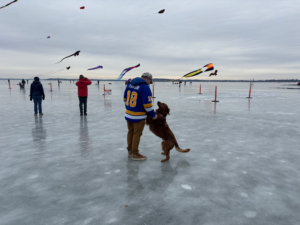
Since 2012, Frozen Assets has raised more than $1,400,000 for lake improvement projects, educational programs and water quality monitoring, according to the Clean Lakes Alliance.
The 5K fundraising race started at 10 a.m. It is the only 5K in North America that is run entirely on a frozen lake. According to the Clean Lakes Alliance, over 700 people participated.
Dalton Hall, 25, ran his first official 5K on the ice at the festival. Running in YakTrax, traction cleats for shoes, helped him and other runners navigate the slick and occasionally lumpy ice.
“It went pretty good,” Hall said. “I didn’t really see anyone fall.”
After the race, competitors enjoyed trying out different activities. Hall chose ice sailing.
“I’ve never even heard of ice sailing before, and I just tried it and it was pretty difficult,” Hall said with a laugh.
The Ice and Snow Sailing World Championships, which ran from Feb. 3 to Feb. 8, were also part of the festival, bringing attention and a larger American audience to snowkiting as a serious sport, according to SurferToday.
“The year 2025 marked the first time an IKA (International Kiteboarding Association) snow kite event was held on the American continent,” according to SurferToday.
The Clean Lakes Alliance also partnered with the Ho-Chunk Nation to bring snow snake to Winter Assets for the first time. Snow snake is an Indigenous competitive winter game in which a player throws a carved wooden stick, the snake, down a narrow etched track in the snow. The goal is to throw the stick the farthest. The game was traditionally played to build trust and community between different tribes and players, according to Discover Wisconsin.
People of all ages slid the snakes, with varying success, while learning about traditional Ho-Chunk culture and the importance of preserving their relationship with the local lakes. Along with people on hand to teach festival attendees about Ho-Chunk knowledge and culture, the festival also included information booths run by the UW–Madison Center for Limnology, a leader in freshwater studies; IceCube, an astrophysics center with an observatory at the South Pole; and the UW–Madison Physics department. Among other issues, the booths demonstrated what happens under the frozen lake and why the cold weather is an asset to the community.
As a first-year PhD student at the Center for Limnology, Kayla Hubbard, 27, helped out at the festival, which had to be moved to the Edgewater’s Grand Plaza last year because the lake wasn’t frozen over.
“We’re teaching people about the lakes, why they are important, why the ecosystems are important and how our activities that we do as humans in our day-to-day lives can impact them,” Hubbard said.
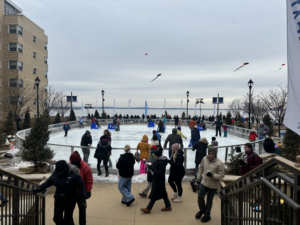
According to Hubbard, it is important to show people how invaluable the lakes are so they will want to protect them in the future.
“Whether for the ecological aspects or even just recreation, I think it’s just really great to bring awareness and just celebrate the lakes,” Hubbard said. “The lakes are awesome in the summer and in the winter, and getting more people engaged in recreation can make people want to take care of the lakes.”
Madison’s local lakes are home to an invaluable ecosystem of plants and animals, including over 160 types of fish native to Wisconsin water, according to Justin Chenevert of the Wisconsin DNR, who presented near the end of the festival.
Lakes are also a key factor for understanding climate change because of their sensitivity to environmental shifts, like an increasing temperature or changes in rainfall. This makes lakes vital for studying climate shifts due to human activity, according to Madison Magazine.
Climate change and inconsistent winter patterns have led to a focus on protecting the lakes year round, especially from agricultural runoff, according to the Clean Lakes Alliance.
Despite these values, local agricultural runoff, pollution from the urban areas and invasive species threaten local waters, including Lake Mendota. As demonstrated by a booth run by Wisconsin Salt Wise inside the Edgewater, one teaspoon of salt pollutes five gallons of water, putting underwater ecosystems at risk.
According to Madison Magazine, human activity has led to pollution in local lakes, and algae blooms have become an expected source of summertime annoyance, including a foul smell.
Frozen Assets helped bring awareness and an appreciation of the importance of the local lakes, and how to value them, even in the winter, so they can thrive year round.
Learn more about how to protect the lakes and how to support the Clean Lakes Alliance here.
